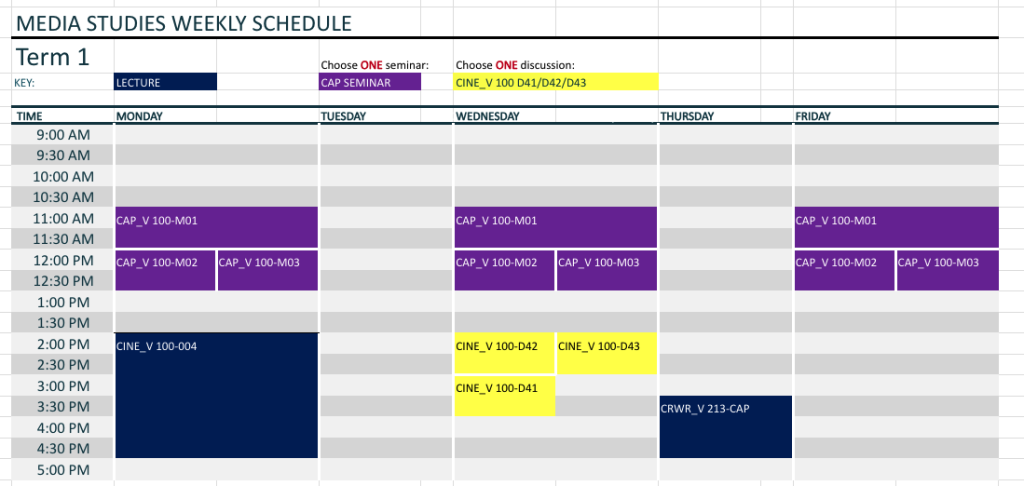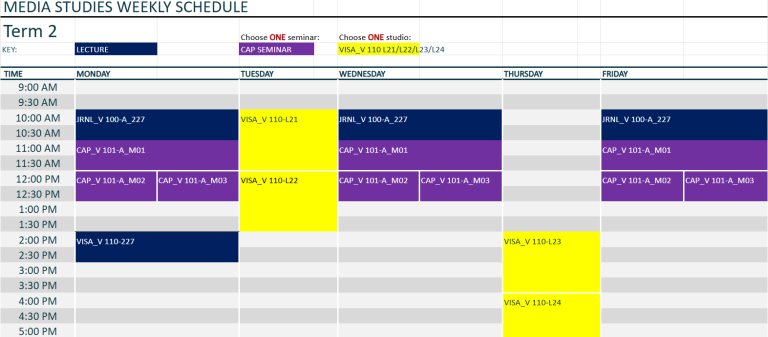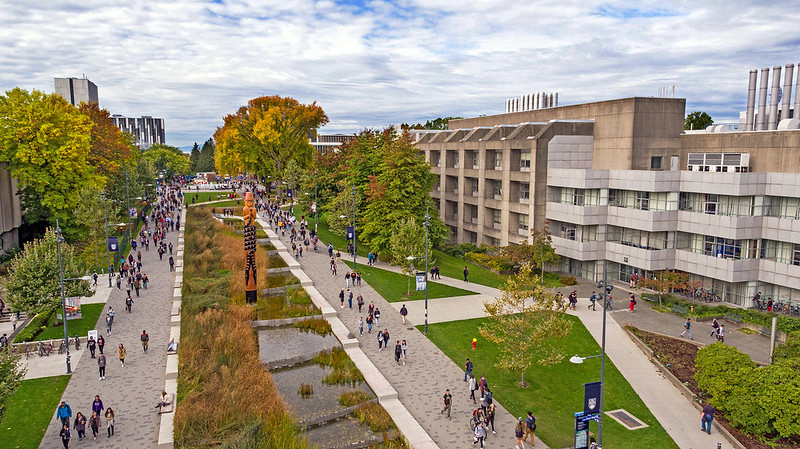Media studies students take hands-on classes in creative writing and visual art, while studying the social, cultural, and political impacts of media in courses on journalism, literature, and film.
This stream fulfills five of the six course requirements for the first year of the Bachelor of Media Studies. Students who have an affinity for making art, analyzing books and films, consuming and discussing contemporary media will find this stream a good fit.
I found CAP to be a great transition into university life. The media studies stream provided a wide range of different courses so that I could experiment with different art disciplines. I found it comforting to know everyone in all of my classes and was able to form new relationships. The small class sizes also helped me engage directly with the professors.
Courses: Term One
In the first term, students will enrol in CAP 100 (fulfills the academic writing requirement), Creative Writing, and Cinema Studies. Through the study of film and through their own academic research and creative writing projects, students will learn how to appreciate and contribute to scholarly conversations and contemporary media.
Analysis of and practice in academic research and writing in the social sciences and the humanities. Restricted to students in the Coordinated Arts Program. Credits count toward the Writing Component of the Faculty of Arts Writing and Research Requirement.
This course is not eligible for Credit/D/Fail grading.
For more information about the connections between CAP 100 and CAP 101A, please visit this page.
CAP_V 100-M01 (MWF 11am-12pm) and CAP_V 100-M02 (MWF 12-1pm) - Instructor: Dr. Kasim Husain
SOCIAL MEDIA AND SOCIAL CHANGE
In 2025, it is becoming unreasonable to call social media “new media." As social media has become an established media form and is so pervasive in our daily interactions, it can be hard to account for just how much social media impacts how we live our lives and connect with others. This brings us to the central question we will discuss in this course: what has social media done to us, and what can we do with social media? Our case studies will entail contrasting scholarly perspectives on how online behaviours impact mental wellbeing, and social media’s role in the revolutions of the so-called Arab Spring in 2011, and in building solidarity for Indigenous rights and/as climate justice. We will evaluate these examples of social media’s individual and societal impacts in relation to films such as Eighth Grade (2018), The Square (2013), and Yintah (2024).
CAP_V 100-M03 (MWF 12-1pm) - Instructor: Dr. Dilia Hasanova
CAP 100 is a writing and research course that focuses on analysis of and practice in academic research and writing in the social sciences and the humanities. In this section of CAP 100, we will explore the role of language in the construction of social identities. The course will focus not only on social factors that contribute to construction of multiple identities but also on how aspects of everyday language relate to social categorizations, such as class, age, gender, and ethnicity. The assignments (in-class and homework) will provide you with the opportunity to study current theories and debates in the field and to reflect on your own experience as a language user in a multicultural society.
By reading a range of texts across disciplines and conducting a variety of writing exercises, you will learn how to recognize and interpret methods of academic scholarship, and how to incorporate these methods into your own writing. In addition, you will learn to write a variety of scholarly genres, including the research proposal, literature review, and research paper.
CRWR_V 213-CAP (Th 3:30-5) - Instructor: Dr. Jennifer Moss
In a digital world shaped by clickbait, AI content, and algorithm-driven virality, how do we preserve depth, originality, and purpose in our creative work? How do we measure our success as writers? How do we connect with others in a way that feels important and authentic? This course is about reclaiming the power of your own creative writing in our fast-moving media landscape. We ask:
● What’s lost when success is only measured in views, likes, and shares?
● What new possibilities open up when we embrace emerging tools—without losing our voice?
● Can storytelling across VR, AR, social media, or AI-driven platforms still feel human, urgent, and true?
● How can digital creativity reduce isolation, shift culture, and build meaningful connections? Whether you’re fluent in digital media or just starting out, CRWR 213 CAP offers a space to explore, experiment, and reflect on what it means to write—and create—with purpose in the age of “new” (as in – constantly evolving) media.
CINE_V 100-004 (M 2-5) - Instructor: Gabrielle Berry
This course aims to introduce you to film as a serious academic discipline through a variety of foundational texts, important essays, and screenings of both familiar contemporary films and films of historical and theoretical significance that will be new to many of you. The material presented in this course will allow you to engage with cinema as a popular medium that is complicated by its ideological impact and struggle for artistic authenticity.
The course is roughly divided into three units of varying length: the first and longest unit is an introductory component on film form that presents you with foundational terminology. The second, shorter unit is focused on Hollywood and its relationship with authorship, genre, and ideology. The course concludes with an exploration of modes that challenge or play with classical film form. Screenings and lectures are supplemented by illustrative clips, extensive reading of a core textbook (Film Art), and essays made available on Canvas.
Courses: Term Two
In the second term, students transition from CAP 100 to CAP 101A, while being introduced to the studies of Visual Arts and Journalism. In addition, technical lab/workshop hours in visual arts class will equip students with the technical skills to create and critique visual media, while journalism class will introduce students to various journalistic skills and ethics.
Applications of research and writing skills in the context of literary, cultural, and media analysis. Topics integrate CAP stream themes and vary each year. Restricted to students in the Coordinated Arts Program.
This course is not eligible for Credit/D/Fail grading.
For more information about the connections between CAP 100 and CAP 101A, please visit this page.
CAP_V 101-A_M01 (MWF 11am-12pm) and CAP_V 101-A_M02 (MWF 12-1pm) - Instructor: Dr. Kasim Husain
IDENTITY STORIES: TAKING (OUR) PLACE IN CONTEMPORARY MEDIA
This course will focus on the theme of identity formation, as captured in contemporary and historical media. The course is made up of two thematic units, linked by the multiple meanings of the phrase “Taking (our) Place.” In our first unit, taking our place means the story of the coming-of-age narrative. Drawing on examples from contemporary fiction and film, we will see how turn-of-the-21st-century themes, such as LGBTQ+ rights and the creative economy, raise questions about how accommodating society is of characters—much less people—who want to take a non-traditional approach to finding a secure and sustaining social role. In our second unit, we will understand the phrase "taking place" in a more aggressive colonizing sense, shifting focus to how “we” as non-Indigenous and Indigenous subjects can find our place in a society founded on the theft of Indigenous land through settler colonialism, as we evaluate a variety of historical and contemporary depictions of Indigenous and settler presence in so-called Vancouver.
CAP_V 101-A_M03 (MWF 12-1pm) - Instructor: Dr. Adrian Lou
CAP 101 is an introductory literature course for students in the social sciences and humanities. The course equips students with the foundational skills to conduct critical analyses of different genres of texts at the university level. Building on CAP 100, CAP 101 will continue to invite students to engage in scholarly conversations by performing the actions of apprentice academic researchers, scholarly communicators, and peer-reviewers.
While it might appear—at first—to be an amusing etymological fact, the English word technology is made up of two Greek words techne and logos, which roughly translates to the art of words or the art of discourse. To think of language as a kind of technology might seem strange to many of us, especially given how contemporary depictions of technology in literature and media often represent technology as cutting-edge mechanical and digital instruments that are built upon advanced scientific innovation. Yet, when we deconstruct the definition of technology and recognize that it ultimately refers to the application of human knowledge for the creation of functional and utilitarian tools, we not only start to see how language is a technology but also how language, like modern technology, is the source of both ground-breaking possibilities and distressing anxieties.
In this course, we examine the ways in which individuals and societies grapple and negotiate new forms of communication as well as new forms of technology. To do this, we explore the convergences of language, technology and the anxiety they produce as represented in novels, films, short stories, essays, television shows and graphic novels. In this course, we examine the ways in which individuals and societies grapple and negotiate new forms of communication as well as new forms of technology. To do this, we explore the convergences of language, technology and the anxiety they produce as represented in novels, films, short stories, musicals, and graphic novels. We will ask various salient questions throughout the term. How do sci-fi horror stories metaphorically represent speculative technologies as sources of contemporary anxieties? How do authors of colour depict the English language, in particular, as tools of oppression? The course will culminate in a research project where students will apply course concepts to analyze a media artifact of their choice. CAP 101 is a 3-credit course that counts toward the Faculty of Arts Writing and Research Requirement.
VISA_V 110-227 (M 2-3) - Instructor: Dr. Joshua Hite
Foundation instruction in techniques and approaches to digital practice. The nature of digital technologies and their role in contemporary culture will be examined.
Please note that this lecture is online.
JRNL_V 100-A_227 (MWF 10-11) - Instructor: TBA
Development of new media technologies, their applications, and their cultural, political, and social impacts.
Courses: Schedule
Preview how a week looks in the stream:
Sample Projects
Self-reflection paper/podcast
Students read stories from Legends of Vancouver, a collection of primarily Squamish stories retold by E. Pauline Johnson. They then visit the sites of selected stories in person to collect observations about the contemporary location, and compose either a written paper or a recorded podcast about the difference it makes to their understanding of this space to become aware of its Indigenous cultural significance. This assignment gives students the chance to practice the research method of autoethnography, as they learn how to frame their personal experience as a legitimate part of scholarly research in Indigenous studies and anthropology. They also have the option to add to skills they have already developed in their CRWR 213 course's podcast script assignment, by both scripting and recording a podcast which they may share with an audience of their peers.
Media object group discussion
Students write brief responses summarizing a contemporary media controversy or cultural object of their own choosing, and framing their critical response to it through Stuart Hall’s account of reception theory. These responses are uploaded to the course website and read by a group of their peers, to form the basis for a twenty-minute discussion in which only their fellow group members attend and participate. The assignment gives students a chance to apply course concepts to new contexts, to practice presenting their ideas in a low-stakes spoken format, and to build rapport with peers.
UBC’s Centre for Community Engaged Learning (CCEL) project
The Media Studies stream will be working with a media-focused community organization and working on a related media project in one or more courses.
Appropriation Project
Starting with the dissection and analysis of a chosen moving image source from popular culture, students appropriate the footage into a new video artwork. Sources are obtained from already circulating artifacts such as film, television, talk shows, commercials, news, cartoons, video games or Vlogs, and are used to create a new artwork by new juxtapositions in editing, alterations, or other effects that reveal, expose or changes the way one understands the meaning of the original footage.
Tumblr Literary Project
Students will spend the last month of the semester working primarily on the Tumblr Literary Project that marks the third and final writing assignment in this class. Through a series of weekly collaborative Tumblr Literary workshops, students will build a multimedia Tumblr site showcasing three original pieces of postcard fiction or creative non-fiction of a similar length. Sampling work from across the web, students will furnish the site with images, video, animation, and text that works to shed new light on and assign new meaning to their writing.
Group presentations
Students will be assigned in groups to present the history and context behind major new media and journalism events.
Tweeting and Blogging
Students will be assigned in groups to use Twitter and an in-class blogging tool to report on class presentations.


